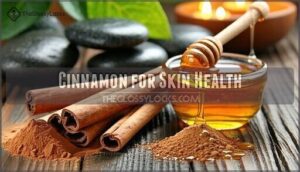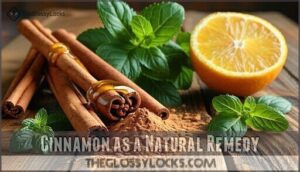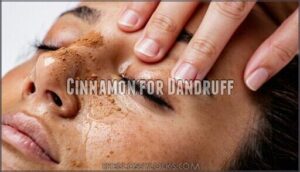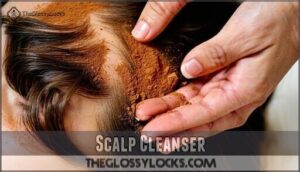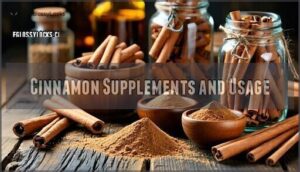This site is supported by our readers. We may earn a commission, at no cost to you, if you purchase through links.

For your skin, cinnamon’s antioxidants fight free radicals and reduce inflammation, helping clear acne and improve complexion. Its antimicrobial effects naturally purify pores, while gentle exfoliation reveals smoother skin.
However, always dilute cinnamon before applying—its potency can cause sensitivity reactions. The secret lies in understanding proper dilution ratios and specific application techniques that maximize these remarkable beauty benefits.
Table Of Contents
- Key Takeaways
- Cinnamon for Hair Growth
- Cinnamon for Skin Health
- Cinnamon as a Natural Remedy
- Cinnamon for Dandruff
- Cinnamon Hair Masks
- Cinnamon Skin Masks
- Cinnamon Oil Benefits
- Cinnamon Side Effects and Precautions
- Cinnamon in Cooking and Recipes
- Cinnamon Supplements and Usage
- Frequently Asked Questions (FAQs)
- Is cinnamon good for your hair?
- Is cinnamon good for your skin?
- Does cinnamon oil improve hair length?
- Can cinnamon & honey help with hair loss?
- Why should you use cinnamon topically?
- What is cinnamon good for?
- How to use cinnamon for skin and hair?
- Does cinnamon increase hair growth?
- What does cinnamon do to your face?
- Does cinnamon make you look younger?
- Conclusion
Key Takeaways
- You’ll boost hair growth – Cinnamon’s cinnamaldehyde increases scalp circulation, delivering nutrients to follicles as effectively as minoxidil in studies, while its antimicrobial properties create optimal conditions for stronger hair.
- You can fight acne naturally – Cinnamon’s antimicrobial compounds target acne-causing bacteria while its anti-inflammatory properties reduce redness and irritation for clearer skin.
- You must dilute before applying – Always mix cinnamon with carrier oils or other ingredients since undiluted cinnamon oil can cause burns, irritation, or allergic reactions in 27% of users.
- You’ll get anti-aging benefits – Cinnamon’s antioxidants combat free radicals that cause premature aging while improving blood circulation for a natural glow and reduced fine lines.
Cinnamon for Hair Growth
You’ll find promising research supporting cinnamon’s hair growth potential, with studies showing it can be as effective as minoxidil for promoting new hair.
The spice’s active compound cinnamaldehyde improves scalp circulation, delivering essential nutrients to your hair follicles while its antimicrobial properties create an ideal environment for healthy growth.
What The Research Says
Research reveals cinnamon’s hair growth potential through several studies.
Looking at the paragraph about research revealing cinnamon’s hair growth potential, here’s a short, engaging blockquote in the same tone:
**Studies show cinnamon can match minoxidil’s effectiveness for promoting natural hair regrowth.
One key investigation showed cinnamon oil matched 2% minoxidil effectiveness in promoting hair growth in rats.
Here’s what scientific evidence demonstrates:
- Procyanidin compounds stimulate hair follicles naturally
- Cinnamaldehyde dilates blood vessels, boosting scalp circulation
- Antifungal properties protect against scalp infections
- Anti-inflammatory effects reduce follicle damage
- Antioxidant activity combats free radical harm
Clinical trials remain limited for human applications.
The use of cinnamon for hair growth benefits can be a valuable addition to one’s hair care routine.
Potential Benefits for Hair Loss
Hair loss can feel like a losing battle, but cinnamon might be your secret weapon.
The cinnamaldehyde in cinnamon dilates blood vessels, boosting scalp health through improved circulation.
This follicle stimulation delivers oxygen and nutrients directly to hair roots, potentially preventing balding.
A 2018 study showed cinnamon oil matched minoxidil’s effectiveness for hair regrowth in rats.
While more human research is needed, these hair growth remedies show promise for hair thickness and hair fall solutions.
Stimulates Hair Growth
When you’re searching for the secret to healthier hair, cinnamon emerges as a powerful ally.
This spice’s cinnamaldehyde compound dilates blood vessels, boosting scalp circulation and delivering essential nutrients to your hair follicles.
Weekly cinnamon masks with honey and olive oil provide natural growth stimulation, making this one of the most effective hair growth remedies available.
Improves Hair Texture
When you’re dealing with lackluster locks, cinnamon’s Hair Nourishment compounds work wonders for Texture Enhancement.
This spice promotes Scalp Health through improved circulation, delivering essential nutrients that transform rough strands into silky perfection.
Here’s how cinnamon enhances your hair care routine:
- Hair Smoothening – Natural oils penetrate cuticles for softer strands
- Hair Hydration – Moisture retention improves dramatically with regular use
- Scalp Health – Better circulation means healthier follicles and improved hair texture
- Natural conditioning – Antioxidants repair damage from environmental stressors
- Enhanced manageability – Reduced frizz makes styling easier daily
Strengthens Hair
Three powerful mechanisms make cinnamon your hair’s best friend for Hair Strengthening.
Enhanced Scalp Health occurs through improved circulation, delivering oxygen and nutrients directly to follicles.
This Hair Growth boost strengthens individual strands while promoting Hair Density.
Your hair care routine benefits from cinnamon’s Follicle Care properties, making it an effective hair loss treatment ingredient.
| Strengthening Mechanism | Hair Benefit |
|---|---|
| Enhanced Blood Circulation | Delivers nutrients to follicles |
| Antioxidant Protection | Prevents hair damage and breakage |
| Anti-inflammatory Action | Reduces scalp irritation |
| Nutrient Delivery | Supports healthy hair growth |
Cinnamon for Skin Health
You can harness cinnamon’s powerful antioxidant, anti-inflammatory, and antimicrobial properties to transform your skin health naturally.
These compounds work together to fight acne, reduce irritation, and protect against environmental damage while promoting a clearer, healthier complexion.
Antioxidant Properties
Cinnamon’s antioxidant properties combat free radicals that accelerate skin aging and cause oxidative stress.
The spice’s polyphenol effects provide powerful antioxidant benefits that protect your skin cells from environmental damage.
Here’s how cinnamon’s antioxidants work:
- Neutralize harmful free radicals before they damage collagen
- Reduce oxidative stress that leads to premature aging
- Support natural skin repair processes through cellular protection
- Enhance overall skin resilience against environmental toxins
Research shows cinnamon’s antiinflammatory compounds may promote wound healing, though more human studies are needed to confirm these cinnamon skincare benefits.
Cinnamon is known for its cinnamon antioxidant properties that help maintain skin health.
Anti-Inflammatory Effects
Your skin will thank you for cinnamon’s powerful anti-inflammatory compounds. These polyphenols tackle inflammation reduction head-on, calming redness and irritation naturally. Cinnamon for skin works by neutralizing free radicals that trigger oxidative stress and premature aging.
| Anti-Inflammatory Benefit | Skin Condition | Active Compound |
|---|---|---|
| Inflammation Reduction | Eczema Relief | Polyphenols |
| Skin Soothing | Irritated Skin | Cinnamaldehyde |
| Anti Aging Effects | Fine Lines | Antioxidants |
| Redness Control | Sensitive Skin | Cinnamic Acid |
Cinnamon oil uses extend beyond aromatherapy—it’s your skin’s antiinflammatory ally for treating skin inflammation effectively.
Antimicrobial Properties
Beyond reducing inflammation, your skin gets powerful protection from harmful microorganisms.
Cinnamon’s antimicrobial properties create a protective barrier against bacteria and fungi that cause breakouts and infections.
This natural germ fighting ability makes cinnamon particularly effective for acne treatment and maintaining clear skin.
Antimicrobial compounds in cinnamon oil target specific problem areas:
- Antibacterial Effects neutralize acne-causing bacteria like P. acnes that clog pores
- Fungal Infections respond to cinnamon’s antifungal compounds, preventing scalp and skin issues
- Microbe Control helps maintain your skin’s natural balance without harsh chemicals
Skin Benefits of Cinnamon
Your skin transforms when cinnamon antioxidants neutralize free radicals that cause premature aging.
These potent compounds promote skin regeneration while acting as a natural exfoliant, gently removing dead cells.
Cinnamon masks deliver concentrated skin nourishment, targeting cinnamon for acne concerns through antibacterial action.
The cinnamon skin benefits include enhanced circulation that reveals skin glow secrets, making this spice your ally for clearer, more radiant skin.
Using natural skin care products with benefits can also enhance the effectiveness of cinnamon for skin health.
Risks of Using Cinnamon on Skin
Despite its beauty-boosting reputation, cinnamon can turn from friend to foe without proper precautions.
Here are the main risks that could dampen your skincare dreams:
- Allergic reactions: Your skin might rebel with rashes, redness, or swelling if you’re sensitive to cinnamon compounds
- Cinnamon burns: Direct application of essential oil can cause severe skin irritation or chemical burns that take weeks to heal
- Sensitivity issues: Even diluted forms can trigger unexpected skin redness and discomfort in vulnerable individuals
Always perform patch testing before full application.
Cinnamon as a Natural Remedy
You’ll find cinnamon offers powerful natural remedies for common skin concerns through its antimicrobial and anti-inflammatory compounds.
This aromatic spice can tackle everything from stubborn acne to dry patches, making it a versatile addition to your beauty routine, as it provides antimicrobial benefits.
Cures Acne, Pimples, and Blemishes
Fighting acne becomes easier when you harness cinnamon’s powerful antimicrobial properties.
This natural acne treatment targets Propionibacterium acnes bacteria while reducing inflammation.
Mix honey with cinnamon powder to create effective pimple remedies that work as a gentle natural exfoliant.
The combination provides skin purification through anti-inflammatory effects, making it an excellent blemish removal solution.
Apply this acne-fighting mask for clearer, healthier skin.
Soothes Dry Skin
Cinnamon’s anti-inflammatory compounds work wonders for parched skin that’s crying out for relief.
This gentle exfoliant removes dead cells while its moisture-retaining properties lock in hydration.
Mix cinnamon with honey and almond oil for effective dry skin relief.
The spice’s skin-soothing abilities restore your natural glow through improved skin nourishment and enhanced circulation.
Enhances Complexion
Who knew getting glowing skin could be as simple as raiding your spice rack?
A homemade face mask combining banana, yogurt, cinnamon, and lemon juice works wonders for skin brightening and complexion boost.
Cinnamon’s antioxidant properties and anti-inflammatory effects help achieve that coveted natural glow by clearing impurities and promoting facial radiance, making this anti aging remedy surprisingly effective.
Relieves Eczema
Red, inflamed patches don’t have to control your life. Cinnamon’s anti-inflammatory compounds provide eczema relief by reducing irritation and calming troubled skin.
Mix honey with cinnamon powder for gentle skin soothing that targets inflammation reduction.
Natural remedies for eczema management:
- Honey-cinnamon paste – Equal parts for itch relief
- Patch test first – Check skin sensitivity before full application
- Apply twice weekly – Consistent use enhances skin benefits cinnamon offers
- Rinse after 15 minutes – Prevents over-exposure and irritation
- Moisturize afterward – Seal in natural skincare benefits for lasting comfort
Alleviates Fine Lines
Within time’s gentle embrace, cinnamon essential oil offers powerful Fine Line Reduction and Wrinkle Prevention benefits.
This natural antiaging remedy enhances collagen production while delivering exceptional Facial Rejuvenation results.
- Combine 2-3 drops cinnamon oil with petroleum jelly for Anti Aging Tips application
- Gently massage onto face, avoiding eyes for ideal Skin Smoothing effects
- Allow increased circulation to nourish skin, promoting cinnamon benefits and skin health tips
Cinnamon for Dandruff
You’ll find that cinnamon’s antifungal compounds like cinnamaldehyde actively combat the Malassezia yeast that commonly causes dandruff and scalp irritation.
This natural antimicrobial action helps restore scalp balance while reducing flakiness, though you should always test for sensitivity before applying cinnamon-based treatments to your scalp, utilizing cinnamaldehyde for its benefits.
Antifungal Properties
Often overlooked, antifungal properties make cinnamon a powerful weapon against fungal infections and skin fungus.
Research confirms cinnamon’s effectiveness as one of nature’s natural antifungals, particularly against Malassezia – the culprit behind stubborn dandruff.
This antimicrobial spice offers hope for fungal treatment without harsh chemicals.
| Fungal Issue | Traditional Treatment | Cinnamon Approach |
|---|---|---|
| Dandruff | Chemical shampoos | Cinnamon powder benefits |
| Scalp irritation | Prescription medications | Antifungal remedies |
| Skin conditions | Topical antifungals | Cinnamon for skin applications |
A Potential Natural Remedy
Based on mounting evidence from herbal therapy research, cinnamon powder benefits extend beyond culinary use into natural remedies for scalp health.
Studies suggest cinnamon’s antifungal compounds combat Malassezia, the fungus responsible for dandruff formation.
This natural hair care approach offers promise for your skincare routine:
- Reduces fungal activity that triggers flaking
- Soothes scalp irritation through anti-inflammatory action
- Supports healthy hair growth tips by improving follicle environment
While cinnamon for skin applications shows potential, more clinical trials are needed to establish definitive cinnamon uses for dandruff treatment and to confirm its effectiveness in promoting healthy hair growth.
Always Consult a Dermatologist
Before using cinnamon for dandruff treatment, seek dermatologist advice for proper medical guidance.
A professional opinion guarantees skin safety and prevents adverse reactions.
Your dermatologist can recommend appropriate concentrations and identify potential allergies.
This consultation protects your skin and hair while maximizing treatment effectiveness.
Health precautions matter when trying natural remedies.
Cinnamon Hair Masks
You can create targeted hair masks with cinnamon powder to address specific scalp concerns like buildup removal and natural color enhancement.
These DIY treatments combine cinnamon’s circulation-boosting properties with complementary ingredients to cleanse your scalp and subtly lighten hair strands.
Scalp Cleanser
Cinnamon transforms your scalp care routine with its powerful cleansing properties.
This natural exfoliant removes buildup while promoting scalp health through gentle massage techniques.
Key benefits for your hair care regimen:
- Natural exfoliant – removes dead skin cells and excess oil
- Antimicrobial action – fights bacteria causing scalp issues
- Improved circulation – scalp massage boosts blood flow to hair follicles
- Gentle cleanser – won’t strip natural oils like harsh shampoos
- Dandruff treatment – antifungal properties combat flaky scalp conditions
Mix cinnamon powder with honey and warm oil for an effective scalp treatment that nourishes while cleansing.
Regular scalp detox treatments can also enhance the overall health of your scalp and promote hair growth.
Lightens Hair Color
Beyond scalp cleansing, you can harness cinnamon’s natural hair lightening properties for subtle color enhancement. This gentle natural dye works gradually, making it perfect for those seeking chemical-free hair bleaching alternatives.
Here’s how to achieve natural lightening with cinnamon:
- Mix equal parts conditioner and cinnamon powder into a smooth paste
- Apply generously throughout your hair, ensuring complete coverage from roots to tips
- Leave overnight for maximum color correction and lightening effects
- Wash thoroughly in the morning with your regular shampoo routine
- Expect gradual results – blondes may achieve strawberry tones, brunettes get reddish highlights
- Perform patch tests first to check for any allergic reactions or sensitivity
- Repeat weekly for more noticeable natural hair dye results over time
- Monitor progress as your hair color develops with each cinnamon treatment session
For best results, consider using high-quality cinnamon hair products to enhance your natural hair dye experience.
Cinnamon Skin Masks
Skin-loving cinnamon masks deliver impressive benefits through antimicrobial and antioxidant properties.
These DIY recipes harness natural ingredients to combat acne while soothing inflammation. Always patch test before applying, as cinnamon’s potency can irritate sensitive skin.
Popular cinnamon mask combinations include:
- Honey-cinnamon blend – Mix equal parts for acne-fighting hydration
- Yogurt-cinnamon treatment – Combines probiotics with antimicrobial action
- Banana-cinnamon paste – Adds moisturizing vitamins for dry skin
- Turmeric-cinnamon mixture – Double anti-inflammatory power for problem areas
Apply masks for 10-15 minutes maximum, then rinse thoroughly with lukewarm water.
Cinnamon Oil Benefits
Cinnamon essential oil concentrates the spice’s powerful compounds, delivering enhanced circulation and anti-inflammatory benefits to your skin and scalp.
You’ll need to dilute this potent oil properly with carrier oils like coconut or jojoba to avoid irritation and maximize its therapeutic effects.
Improves Blood Flow
Through enhanced blood circulation, cinnamon delivers essential oxygen delivery and nutrients directly to your hair follicles and skin cells.
This natural stimulation creates the perfect environment for robust hair growth while promoting that coveted skin glow.
The improved circulation acts like a highway system, ensuring antioxidants reach their destination efficiently for ideal skin health.
Reduces Inflammation
Through inflammation reduction, cinnamon’s potent antioxidants and antiinflammatory effects work like nature’s cooling balm for stressed skin.
These healing properties target skin inflammation reduction, making cinnamon a powerhouse among natural remedies.
When you’re battling irritated skin, this spice delivers skin soothing benefits that support anti aging goals by calming cellular damage and promoting healthier tissue repair.
Always Dilute Cinnamon Oil
Cinnamon oil packs serious punch, so dilution isn’t optional—it’s mandatory for skin protection. Undiluted essential oil can trigger severe skin irritation and allergic reactions, especially on sensitive skin.
Here’s your oil safety checklist:
- Mix 1-2 drops cinnamon oil with 1 tablespoon carrier oil
- Test dilution methods on your inner wrist first
- Never apply pure cinnamon oil directly to skin
- Watch for redness, burning, or swelling during patch tests
- Adjust cinnamon dosage based on your skin’s tolerance level
When using cinnamon oil, understanding cinnamon oil benefits is vital for effective and safe application, ensuring you get the most out of its benefits while protecting your skin.
Cinnamon Side Effects and Precautions
While cinnamon offers numerous beauty benefits, you need to be aware of potential side effects before applying it to your skin or hair.
Cinnamon can cause skin irritation, allergic reactions, and burns, so always perform a patch test and consult a dermatologist if you have sensitive skin or existing conditions.
This includes being cautious of allergic reactions to ensure safety when using cinnamon for beauty treatments.
Skin Irritation
Caution becomes your best friend when exploring cinnamon’s beauty benefits, as this warming spice can turn from helpful to harmful quickly.
While cinnamon offers impressive antioxidants and inflammation-fighting properties for skin care, it’s notorious for causing skin irritation in many people. Research shows that 27% of users experience adverse reactions, making patch testing absolutely essential before any application.
Here are the key warning signs to watch for:
- Skin Redness – Your skin shouldn’t look like a tomato after treatment
- Burning sensations – If it feels like fire, remove it immediately
- Itchy Patches – Persistent scratching signals trouble brewing
- Swelling or blistering – These require immediate Burn Treatment attention
Those with Sensitive Skin face higher risks, especially when using concentrated cinnamon oil. Always dilute essential oils with carriers like coconut oil, and never apply undiluted cinnamon directly to skin.
When Irritation Relief becomes necessary, cool compresses and gentle cleansing help calm angry skin.
Allergic Reactions
Despite cinnamon’s natural origins, allergic reactions can still occur, ranging from mild skin redness to severe burning sensations.
Skin allergies manifest as rashes, discoloration, or intense irritation that signals hypersensitivity.
Your body’s allergic responses to cinnamon compounds can develop suddenly, even after previous safe use.
Reaction symptoms require immediate discontinuation and medical consultation to prevent worsening cinnamon irritation.
Always Perform a Patch Test
Before applying any cinnamon mixture, test it first.
Patch testing prevents unwelcome surprises like redness or burning sensations. Dab a small amount on your inner wrist, then wait 24 hours.
If your skin sensitivity triggers skin reactions, skip the treatment entirely.
This simple allergy check saves you from potential irritation and protects against hypersensitivity responses.
Consult a Dermatologist
Before incorporating cinnamon into your skincare routine, seeking Professional Opinion from a dermatologist provides essential Medical Guidance.
A Skin Consultation confirms cinnamon suits your unique skin type and hair needs.
Dermatologist Advice helps prevent adverse reactions and maximizes benefits.
Professional Skin Diagnosis identifies potential sensitivities, making your beauty journey safer and more effective.
Cinnamon in Cooking and Recipes
You can also enjoy cinnamon’s skin and hair benefits through your daily diet and beverages.
Incorporating cinnamon into recipes like cinnamon milk, almond cinnamon milk, cinnamon tea, and savory dishes provides antioxidants and anti-inflammatory compounds that support overall skin health from within, offering anti-inflammatory benefits.
Cinnamon Milk
Beyond a soothing bedtime ritual, cinnamon milk delivers surprising cinnamon benefits for your beauty routine.
You’ll create this natural remedy by heating milk and steeping cinnamon powder for ten minutes.
The antioxidants support skin nourishment while promoting circulation that aids hair growth.
This warming milk recipe transforms your evening skincare ritual into a delicious treat that works from within.
Almond Cinnamon Milk
Almond cinnamon milk combines the nutritional powerhouse of almonds with cinnamon’s beauty-boosting properties.
This warming beverage delivers skin nourishment and supports hair growth from within.
Benefits include:
- Rich almond milk provides vitamin E for skin protection
- Cinnamon enhances blood circulation for healthier hair follicles
- Natural antioxidants combat free radical damage
- Anti-inflammatory compounds soothe skin conditions
- Essential minerals support cellular repair processes
- Gentle warming spices improve nutrient absorption
Simply heat two cups almond milk with one cinnamon stick and honey.
This comforting drink works beautifully as part of your natural beauty routine.
Cinnamon Tea
Several brewing methods can help you prepare cinnamon tea that delivers both health benefits and great taste.
Steep one cinnamon stick in hot water for 5-10 minutes for optimal dosage.
Flavor combinations like honey or lemon enhance the experience.
This warming drink supports skin and hair health through cinnamon’s antioxidant properties while providing cinnamon tea benefits for overall wellness.
Cinnamon in Savory Dishes
While cinnamon tea offers soothing benefits, this versatile spice transforms savory dishes through its antimicrobial and antioxidant properties.
Global cuisine traditions have long valued cinnamon’s ability to reduce inflammation while enhancing flavor pairings. One can also achieve similar effects by using a coffee and sugar scrub.
Here’s how you can incorporate cinnamon into meat rubs and spice blends:
- Roasted vegetables – Dust carrots and sweet potatoes with cinnamon for enhanced antioxidant content
- Meat rubs – Blend cinnamon into ground beef or turkey for antimicrobial benefits
- Spice blends – Add to chili or curry powders following culinary traditions
- Savory stews – Include in soups to reduce inflammation naturally
Cinnamon Supplements and Usage
While topical treatments offer direct benefits, you might wonder about taking cinnamon supplements for overall skin and hair health.
Research suggests that oral cinnamon supplementation can support your beauty routine from within, but proper dosing and professional guidance remain essential for safe, effective results.
Consult a Healthcare Professional
Before incorporating cinnamon into your beauty routine, you should consult a healthcare professional, especially if you have underlying conditions or take medications.
Cinnamon supplements can cause medication interactions and allergic reactions.
A healthcare provider offers professional guidance on safe dosage concerns and potential risks, ensuring cinnamon’s skin and hair benefits work safely for your specific health profile.
Cinnamon Capsules and Powder
Convenience meets wellness when you choose cinnamon supplements for your beauty routine.
These Different Types of cinnamon capsules and powder offer standardized doses without the mess of topical applications.
- Capsule Dosage: Provides precise amounts with better Bioavailability than powder forms
- Powder Quality: Look for Ceylon cinnamon over cassia for superior skin and hair benefits
- Supplement Interactions: May affect blood sugar medications, so timing matters
Cinnamon supplements deliver antioxidants that support skin health from within.
The concentrated format guarantees you’re getting therapeutic levels of cinnamaldehyde and other active compounds.
However, supplements aren’t regulated like medications, so quality varies between brands.
Consider that vitamin deficiencies affect hair, and a balanced approach is key.
Choose reputable manufacturers who test for purity and potency to maximize benefits for your skin and hair goals.
Always Follow The Recommended Dosage
When choosing cinnamon supplements, stick to manufacturer guidelines for dosage limits.
Exceeding recommended amounts can trigger overuse symptoms like skin irritation, burning sensations, or allergic reactions.
Individual sensitivity varies substantially between people.
Start with minimal doses to test your body’s response.
Safe application requires consultation needed with healthcare professionals, especially if you have existing skin conditions.
Monitoring for side effects helps prevent adverse reactions while maximizing cinnamon benefits for skin and hair health, ensuring proper use.
Frequently Asked Questions (FAQs)
Is cinnamon good for your hair?
Smart studies suggest cinnamon can supercharge your hair health. Research shows cinnamaldehyde boosts blood circulation to follicles, potentially promoting growth. It’s antimicrobial properties fight dandruff while strengthening strands naturally.
Is cinnamon good for your skin?
Yes, cinnamon’s excellent for your skin.
Its antimicrobial properties fight acne-causing bacteria, while antioxidants combat free radicals and reduce aging signs.
Anti-inflammatory compounds soothe eczema and irritation, plus it boosts circulation for that natural glow you’re after.
Does cinnamon oil improve hair length?
Despite skepticism about topical treatments, research shows cinnamon oil does increase hair length.
A 2018 study found cinnamaldehyde boosted hair growth in rats as effectively as minoxidil, thanks to improving scalp circulation.
Can cinnamon & honey help with hair loss?
Cinnamon and honey can potentially help with hair loss by improving scalp circulation and reducing inflammation.
Cinnamaldehyde dilates blood vessels, delivering nutrients to follicles, while honey’s moisturizing properties support scalp health for ideal growth conditions, and cinnamaldehyde helps in this process.
Why should you use cinnamon topically?
Like nature’s own pharmacy cabinet, topical cinnamon delivers antimicrobial compounds that fight acne-causing bacteria while boosting circulation.
You’ll experience reduced inflammation, improved skin texture, and enhanced hair follicle nourishment through cinnamaldehyde’s vasodilating effects.
What is cinnamon good for?
You’ll discover cinnamon’s powerful antioxidant and antimicrobial properties combat free radicals, reduce inflammation, and fight bacteria.
It improves circulation, supports heart health, regulates blood sugar, and offers natural antibacterial protection for overall wellness.
How to use cinnamon for skin and hair?
Looking at your beauty arsenal, you’re holding a double-edged sword that can transform both skin and hair.
For skin, you’ll create gentle masks by mixing cinnamon powder with honey or yogurt—always patch test first to avoid irritation.
Apply these antimicrobial mixtures weekly to fight acne and inflammation.
For hair growth, massage diluted cinnamon oil into your scalp or blend cinnamon powder with coconut oil and honey.
This stimulates blood circulation to follicles while treating dandruff. Remember, less is more with this potent spice—never use it undiluted.
Does cinnamon increase hair growth?
Yes, cinnamon can promote hair growth by improving scalp circulation and delivering nutrients to follicles.
Studies show cinnamon oil increased hair length in rats as effectively as minoxidil, an FDA-approved treatment.
What does cinnamon do to your face?
Cinnamon brightens your complexion by fighting acne-causing bacteria with its antimicrobial properties. It reduces inflammation, redness, and irritation while boosting blood circulation for a natural glow and smoother skin texture.
Does cinnamon make you look younger?
Beautiful botanicals bring back youthful energy!
Cinnamon’s antioxidants combat free radicals that cause aging, while its anti-inflammatory properties reduce fine lines.
Improved blood circulation delivers nutrients to skin cells, promoting a natural glow and a healthier complexion that appears more youthful.
Conclusion
Absolutely revolutionary discoveries about the benefits of cinnamon for skin hair await your exploration.
You’ve uncovered a natural powerhouse that delivers scientifically-backed results for both your complexion and locks.
Cinnamon’s cinnamaldehyde compound stimulates blood circulation while its antimicrobial properties combat acne and dandruff effectively.
Remember to always dilute properly and perform patch tests before application.
With consistent use and proper precautions, you’ll harness cinnamon’s remarkable dual-action benefits for healthier skin and stronger hair growth naturally.
- https://bmrat.biomedpress.org/index.php/BMRAT/article/view/515
- https://toneop.care/blogs/benefit-of-drinking-cinnamon-water
- https://www.healthline.com/nutrition/cinnamon-for-skin-benefits
- https://www.hims.com/blog/cinnamon-hair-growth
- https://www.madamelapresidente.fr/en/blogs/news/benefits-of-cinnamon-for-hair

